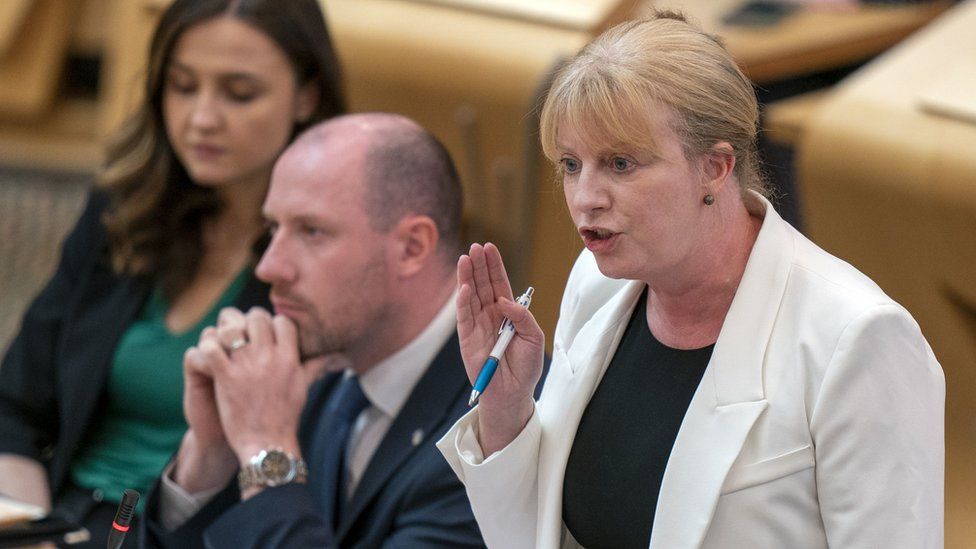New Scottish income tax band might only raise £60m
- Published
- comments

Adding a new higher-rate income tax band in Scotland might only raise £60m, a leading fiscal think tank has warned.
The Scottish government is reportedly considering introducing a new tax level in a bid to plug a gap in its budget.
The Fraser of Allander Institute (FAI) said the funding shortfall was around £1.5bn, between day-to-day spending commitments and capital projects.
But the group said adding a new 45% tax band for earnings over £75,000 would only raise around £60m for spending.
Finance Secretary Shona Robison will set out her budget proposals on Tuesday and has referred to the reports about tax rises as "speculation".
Ms Robison has said the 2024-25 budget is being set amid some of the most difficult financial conditions in the history of devolution.
The FAI agreed in its pre-budget report that ministers face "difficult choices" in terms of what to prioritise.
The think tank said the gulf between expected income and existing spending proposals had increased to at least £1.5bn.
It could be even wider depending on the final cost of public sector pay deals, driven by inflation.
The Scottish government has complained of a lack of extra funding flowing from Westminster due to spending decisions made by Chancellor Jeremy Hunt.
However the FAI noted that ministers had also made a number of big spending pledges, including a council tax freeze which is forecast to cost more than £300m.
The government has also pledged to spend an extra £100m on cutting NHS waiting lists, and the FAI said that £325m of "savings" identified for the current financial year had effectively been taken out of the budget now being drawn up, because spending had been pushed back.
Ms Robison has the option of increasing taxes to help fill this gap - and indeed the FAI said the devolved income tax system has brought in an extra £600m for next year's budget, thanks to better than expected tax forecasts.
A series of cabinet meetings have been held to discuss the plans, and the Times newspaper claimed the first minister had settled on a move similar to one suggested by the STUC union, which would see a new 45% tax band introduced for earnings over £75,000.
The FAI said that accounting for behavioural change - the idea that people could reduce their hours or income in the face of large tax increases - such a move would raise about £60m for the budget.
Director Prof Mairi Spowage said: "The deputy first minister may choose to use powers over income tax to raise more revenue to plug the gap, but it is unlikely that this would be sufficient in isolation.
"Significant spending cuts are also likely to be required - the deputy first minister has the unenviable task of choosing where the axe will fall."
The finance secretary does not want to give away anything about her tax plans until they are announced in parliament - and she stressed that she does not have control over as many fiscal levers as the UK government.
However she said that "we do believe in the principle that those with the broadest shoulders should pay a bit more".
Ms Robison also said "difficult decisions" were being made on spending.
'Worst-case scenario'
The health service will be protected, while ministers have increased funding for social security, having expanded benefits like the Scottish Child Payment.
The commitment to the council tax freeze also seems unshakable, with Ms Robison saying that talks are focused on how much it will cost rather than whether it will happen.
Scotland's councils have been pushing for extra funding for local services, with umbrella body Cosla warning that some face the prospect of running out of money.
Ms Robison has also told BBC Scotland that the public sector workforce will have to shrink with the pay bill rising in light of recent pay deals.
With health - accounting for a third of public sector staffing - to be protected, the 48.5% working in local government may be more at risk.
Ms Robison's predecessor as finance secretary, Kate Forbes, has warned against income tax rises, saying they would not deliver extra revenue due to behavioural changes.
And the Scottish Conservatives said it would be "naïve in the extreme" of the government to try to "tax its way out of an ever-growing black hole".
Scottish Labour leader Anas Sarwar told BBC Scotland that budgetary pressures were not a short-term issue, but the result of "16 years of financial mismanagement and SNP incompetence".
He said: "I think its absolutely ludicrous that we continue say to people across this country, we expect you to pay more and get less."
Ms Robison said: "If our funding had kept pace with inflation, the Scottish government would have had a billion pounds of extra spending power over the last two years - but of course the Westminster government did not do that.
"I set out in May the challenge for the public finances, and the fact that pay deals were in excess of what was in the budget because of inflation.
"I have had to set out savings this year, and that's been compounded by the Autumn Statement which all commentators say has prioritised tax cuts over public spending, which will make our budget decisions even more difficult."
Related Topics
- Published23 November 2023
- Published6 April 2023